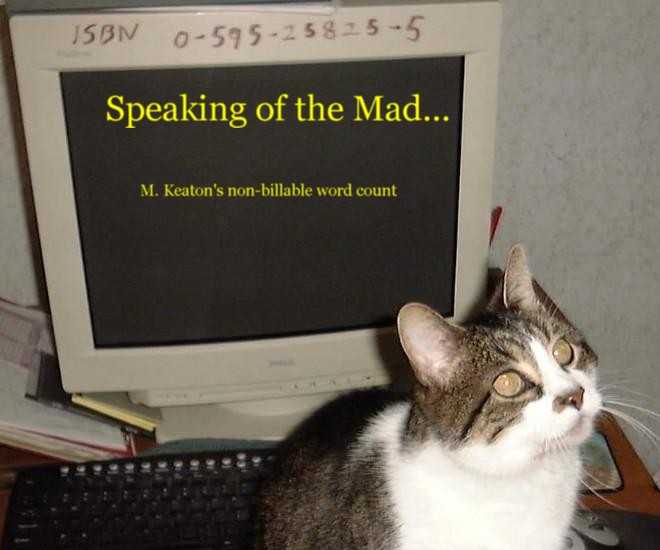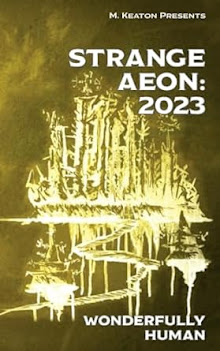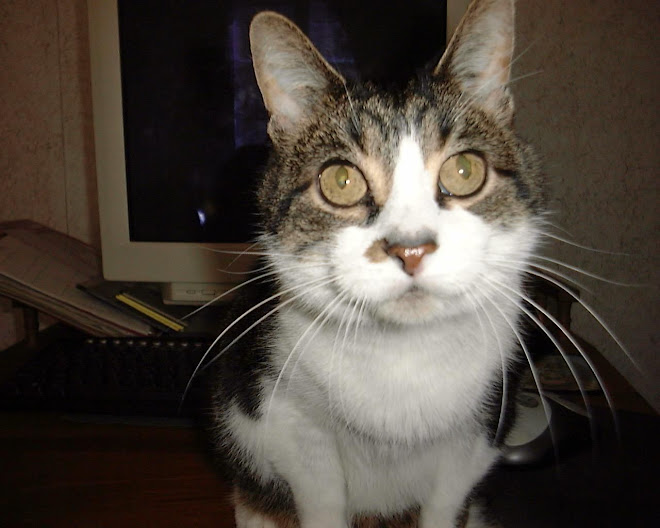I thought I'd round out the year by posting the two interviews the Thin Man has done for Kilimanjaro magazine about his novels, just in case you were new to the site and wanted to know a little more about them. First, the S&K interview.
An Interview With the Author of Speakers and Kings, M. Keaton
Q: To start with, what is Speakers and Kings about?
A: The short answer is: wartime epic fantasy in a medieval, quasi-Arabic context. The long answer is, well, longer. The “what if” premise is a race of spirit beings (called the Eerith) that are telepathic, which means they have no language, and are ex-slaves with no history; they joined the world ‘in progress’ and were immediately enslaved. With no history and no language, what kind of people are they? What do they do? That’s where it all starts. How important is the past to the present? How important is history and a physical body to language and how important is language to individuality?
Q: So, pretty heavy philosophy?
A: No, yes, a little. Those are the underlying themes that drive the actions and the story is about the actions. The book really covers the decade or so of jyhad with these spirits being caught in the middle of the war. There’s plenty of action. Let me try it again: the book is the story of a war and the focus is the people caught in the middle of this war. The deeper themes come into play with the actions of the Eerith on both sides. The story is on two levels. There are some parts that can get deep if the reader wants to really dwell on them but if the reader doesn’t want to, they don’t have to, the action moves things along on its own.
Q: You dedicated the book to the men and women of the armed forces. Why?
A: First off, the fact that they are out there defending my country is always sufficient reason to dedicate something to them. In this case, there was a little more to it.
A lot of my ‘beta-readers’, the folks I run my rough drafts past, are in the military and they were a lot of help to begin with since this book is about a war. But, while I wrote it, there was the attack on the USS Cole and the embassy bombings and then 9-11. I was about halfway through the final version when the US was attacked and I just froze. It just didn’t seem right to be writing about a made up war when we were in the middle of the real one.
Now the humbling thing occurs. These guys out there, going off to fight and die, start e-mailing me to see if I’m all right. That’s the kind of men and women we have in this country’s military, that kind of selflessness. They tell me, to paraphrase, “Write the book. We need it. Distract us and tell us a story of honor and nobility, good versus evil.” The book became a lot deeper, a lot more personal, and a lot more important then because it really became for them. I went to press right before we rolled into Iraq.
As a nation, really as a culture, we’ve lost the good wholesome stories. Everything is about ‘sensitive cultural issues’ and angst and navel gazing and shades of gray. Nobody’s telling the good tales of men being men and fighting the good fight. I’ve always said that my writing was to balance that kind of thing, that I’d tell the good pulp adventure and let other people worry about writing the great novels. I really hope that with SK I’ve done that, for them.
Q: Did you do anything different in this book than you would have otherwise because of that?
A: Yes, but no one seems to have noticed it. I broke a lot of the so-called rules of writing to cater to the real-world needs of my readers. I’ve jokingly called myself the modern master of the serial because of the way I structured the book. Every chapter is like an episode in the old movie reel serials. Each chapter begins and ends and the reader can put the book down at the end of each chapter. Like the old serials, there are cliff-hangers and the like but I break the rule that says never give the reader a good stopping point. Also I tried to keep each chapter under fourteen thousand words so that it could be read in about an hour and I don’t slow down or repeat myself or explain everything to death. The reason is, these guy have a few hours a day of free time and then hours of duty at station, much of which is watching and waiting. I tried to give them a book that they could read one chapter at a time, in the time window that they had, with enough meat on the bones that they could think and talk about it while they were on duty if it was a boring day—and I pray that every day on duty is a boring day.
The one thing that I couldn’t change that I wish I could is the price. I truly wish that the economics were such that I could give the book to our soldiers for free. That’s part of why I’m such a proponent of the ASEs. We pay fat toad Senators a small fortune to pass laws stealing our freedoms while we give the poor guys risking their lives to protect our freedoms a shiny nickel and a pat on the head. Free books are the least we should do.
Q: What about non-military people, is the book accessible to them?
A: Oh yes. It’s a solid book no matter where you come at it from. In fact, I’ve gotten a lot of feedback from teenagers and women who really like it. That surprised me because I figured that I was writing a very masculine book but I also have strong women as main characters too. I think the, well, moral clarity of the characters and the fact that they struggle with themselves without selling out, angst without lapsing into self-pity; I think that’s really refreshing to a lot of people, especially young readers.
Q: A required interview question, why buy your book?
A: I need to buy groceries. Seriously though, it’s a good book, maybe a great one. That’s not me talking, I can’t judge my own work. That’s what the readers are telling me. They don’t just like it; they’re blown away. I have a weird kind of second-hand confidence. Enough people have told me it’s good that I have to admit that it is.
Q: Last question. What is Dog?
A: (laughs) Nope. No way. I’m not telling.
Sunday, December 28, 2008
Subscribe to:
Post Comments (Atom)





















No comments:
Post a Comment